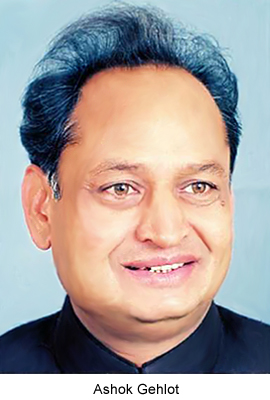 Rajasthan" border="1">Ashok Gehlot is the present Chief Minister of Rajasthan. He is the 21st and 23rd Chief Minister of the state. He is a renowned politician and belongs to the Indian National Congress party. His first tenure of Chief Minister was during the period 1998-2003. As the current Chief Minister, Gehlot was sworn in on 13 December 2008. Previously he was the minister of the Lok Sabha and a junior minister in the Central Government of India. Ashok Gehlot comes from the city of Jodhpur and belongs to the Sainik kshatriyas Rajput community of Mandore, Marwar.
Rajasthan" border="1">Ashok Gehlot is the present Chief Minister of Rajasthan. He is the 21st and 23rd Chief Minister of the state. He is a renowned politician and belongs to the Indian National Congress party. His first tenure of Chief Minister was during the period 1998-2003. As the current Chief Minister, Gehlot was sworn in on 13 December 2008. Previously he was the minister of the Lok Sabha and a junior minister in the Central Government of India. Ashok Gehlot comes from the city of Jodhpur and belongs to the Sainik kshatriyas Rajput community of Mandore, Marwar.
Early Life of Ashok Gehlot
Ashok Gehlot was born on 3 May 1951 in Jodhpur, Rajasthan to Lachman Singh Gehlot. He did his graduation in science and Law and his master degree in economics. He married Smt. Sunita Gehlot on 27th November 1977. Together this couple has a son Vaibhav and a daughter Sonia.
Political Career of Ashok Gehlot
In the year 1980 Ashok Gehlot was elected as the member of Public Accounts Committee in the 7th Lok Sabha from Jodhpur Parliamentary Constituency. He had been the Union Deputy minister in the department of tourism in the year 1982. Shri Gehlot served as the Home and PHED Minister, Government of Rajasthan from June 1989 to November 1989. In 1991 he was appointed as the Union minister of the state in the department of Textiles. Gehlot also served for the Union Cabinet of former Indian Prime Ministers Indira Gandhi, Rajiv Gandhi and P.V. Narsimha Rao for three times. He has served in the Union Cabinet three times. He remained Union Deputy Minister of Tourism and Civil Aviation when late Smt. Indira Gandhi was the Prime Minister of India. Thereafter, he became the Dy. Minister of Sports. For his commendable work he was elevated to the rank of State Minister. Later, he was made the Union Minister of State, Textiles with Independent Charge.
Gehlot became the member of the 11th Rajasthan Legislative Assembly in February 1999 after elected from Sardarpura (Jodhpur) Assembly Constituency. Shri Gehlot was re-elected from the same Assembly Constituency on 4 December 2003 for the 12th Rajasthan Vidhan Sabha and on 8 December 2008 for the 13th Rajasthan Vidhan Sabha.
He was made the General Secretary of All India Congress Committee on 17 July 2004. He was sworn in as the current Chief Minister of Rajasthan on 13 December 2008 preceded by Vasundhara Raje Scindia.
Positions held by Ashok Gehlot
Member of Parliament (Lok Sabha)
1980 - 84 - Seventh Lok Sabha
1984 - 89 - Eighth Lok Sabha
1991 - 96 - Tenth Lok Sabha
1996 - 98 - Eleventh Lok Sabha
1998 - 99 - Twelfth Lok Sabha
1980 - 82 - Member, Public Accounts Committee, Lok Sabha
1982 - 83 - Union Deputy Minister, Department of Tourism
1983 - 84 - Union Deputy Minister, Department of Tourism and Civil Aviation
1984 - 84 - Union Deputy Minister, Department of Sports
1984 - 85 - Union Minister of State, Department of Tourism and Civil Aviation
1989 - 89 - Minister, Department of Home and PHED, Govt. of Rajasthan
1991 - 93 - Union Minister of State, Department of Textiles (Independent Charge)
1991 - 96 - Consultative Committee on Communication (Lok Sabha)
1991 - 98 - Standing Committee on Railway (10th & 11th Lok Sabha)
1996 - 98 - Consultative Committee on External Affairs (Lok Sabha)
01-12-98 to 04-12-03 - Chief Minister, Rajasthan
13-12-2008 to Present - Chief Minister, Rajasthan
Other positions held by Ashok Gehlot
1974 - 79 - President, Rajasthan NSUI
1979 - 82 - President, City District Congress Committee, Jodhpur
1982 - General Secretary, Rajasthan Pradesh Congress Committee
1985 - 89, 1994-97, 1997 - 99 - President, Rajasthan Pradesh Congress Committee
Social work of Ashok Gehlot
Ashok Gehlot has also been associated with social work for the upliftment of the masses. Gehlot worked in the refugee camps at Bangaon and 24 Parganas districts, West Bengal during the liberation war of Bangladesh in 1971. Through Nehru Yuva Kendra he contributed for the extension of adult education. He has been actively associated with Kumar Sahitya Parishad as well as Rajiv Gandhi Memorial Book Bank, Jodhpur.
Shri Gehlot is the founder president of Bharat Seva Sansthan Gehlot is also the Chairman of Rajiv Gandhi Study Circle, New Delhi which caters to the interests of university/ college students and teachers across the country.




















